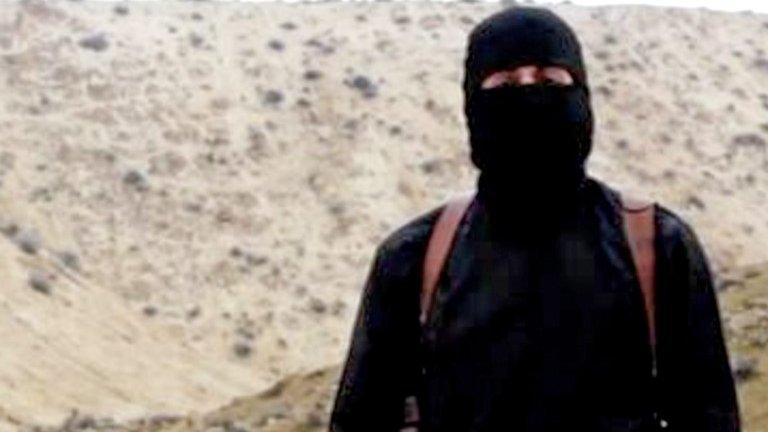'Jihadi John' UK harassment claims revealed in emails
- Published
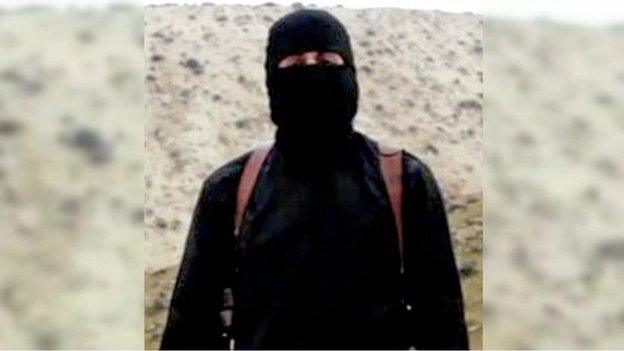
British advocacy group Cage has disclosed an exchange of emails it says it has had with Mohammed Emwazi, the Islamic State militant known as "Jihadi John".
Cage campaigns against "state policies developed as part of the War on Terror" and says Emwazi first contacted it in 2009 to complain about being interrogated by a British official at Schipol Airport after trying to visit Tanzania.
In one email, he described being interrogated in Amsterdam by an MI5 officer who identified himself as "Nick".
"He knew everything about me; where I lived, what I did, the people I hanged around with," he wrote.
'Wanted the truth'
"He also believed that I was lying [about the holiday in Tanzania] and I wanted to go to Somalia.
"Then he made a face and said, 'I am going out of the cell now and by the time I come back, I want you to think about what do you want to say to us'.
"I said to him that before you go out you have to tell me that what you want from me. He said that he wanted the truth.
"I said, 'Bloody hell! I just told you what was our plan and where were we [are] going and you still think that I am lying. What do you want from us?'
"He pointed his finger at me and said to me, 'Don't try to play smart and lie on my face. Don't try to fool me. YOU WANTED TO GO TO SOMALIA'."
'Lot of trouble'
According to Emwazi, the agent later said: "Listen Mohammed: You've got the whole world in front of you; you're 21 years old; you just finished uni - why don't you work for us?"
Emwazi said he could not and would not help.
He said the agent replied: "You're going to have a lot of trouble... you're going to be known... you're going to be followed... life will be harder for you."
The agent reportedly added: "We'll see you in London, mate".
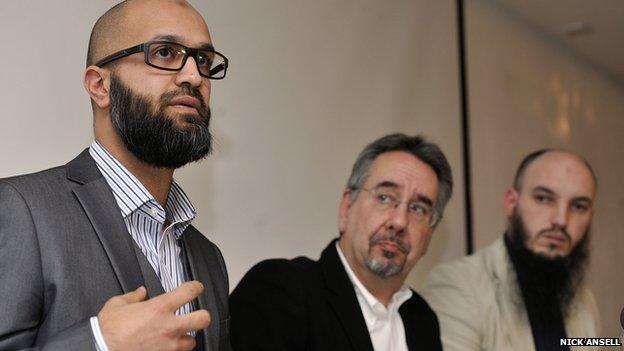
Asim Qureshi (left) of Cage corresponded and met with Mohammed Emwazi
He arrived back in the UK at Dover and said he was interrogated again.
Describing part of that questioning, he said: "When I was face to face he [MI5 agent] said to me, 'Mohammed, what do you think of 7/7?'
"I thought he wanted to see my instant reaction so I told him that it was nothing else but extremism.
"Then he said, 'OK and what do you think of war in Afghanistan?'.
"I said, 'What do I think! We see innocent people being killed in news daily'.
"Then he asked me what I thought of 9/11.
"I said to him that whatever happened was not right and if it was in my hands to bring all those lives back, I would have."
'Aggressive questioning'
In September 2009, Emwazi left the UK for Kuwait to "avoid being further harassed", Cage said.
He told the advocacy group he had plans to marry and settle down there, but wanted to see his family in the UK first.
He reportedly made visits in May and June of 2010, but was stopped as he returned to the airport to go back to Kuwait.
In emails, he said three men and one woman, who did not identify themselves, took him into a side room for questioning "under a terrorism act", he said.
"During the process of answering these questions and many more, one random officer wearing an Indian turban entered, and started also searching through my bags," he wrote.
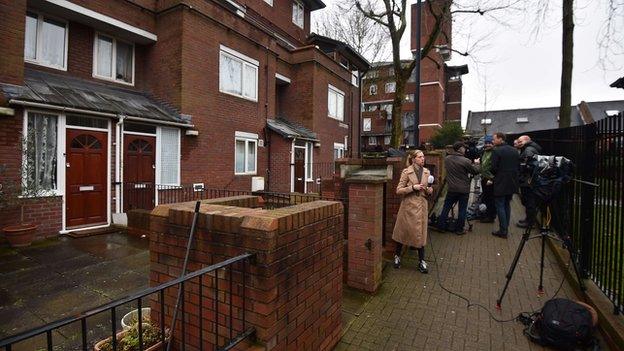
Journalists have gathered outside an address in London where Emwazi is once believed to have lived
"He reached out for the Holy Quran and put it on the floor and I asked him to put it onto the chair rather than on the floor.
"He started to get aggressive, changing his tone of voice.
"He said, 'I've put it onto the chair now, so just shut up', and I replied, 'You shut up'."
During the questioning, which lasted five or six hours, he said he had his DNA, fingerprints and photograph taken.
He wrote that it reminded him "of criminals that you see on TV who have committed a serious crime, only I was a person never charged or arrested for anything".
'Living in a cage'
Having missed his flight from the UK to Kuwait, Emwazi wrote that he returned to the airport the next day with his father.
He said he was told his visa for Kuwait had been blocked.
According to Cage, he blamed UK intelligence services for this and wrote: "I had a job waiting for me and marriage to get started. But know [sic] I feel like a prisoner, only not in a cage, in London".
"A person in-prisoned [sic] and controlled by security service men, stopping me from living my new life in my birthplace, and my country, Kuwait."
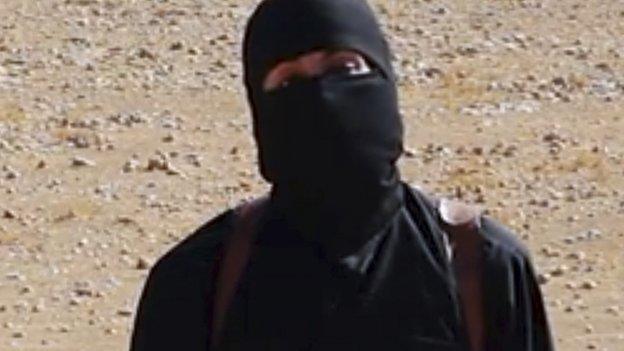
Mohammed Emwazi wanted to emigrate to Kuwait but claimed UK intelligence services blocked his visa
Cage said that around this time, Emwazi's emails began to link his own difficulties with the wider world.
He was "witnessing perceived injustices everywhere", it said.
On 31 July 2010, he sent the group a link to a video of an elderly man being beaten.
"Just wanted to share this video with you brothers, notice at the end of the video these evil people start brutally beating old, white bearded, poor men brothers," he wrote.
"Brother in cage-prisoners, please keep up your good work and help rescue these poor people from the hands of the oppressors!!"
Other emails spoke of alleged abuses taking place in Chechnya, and claimed that Americans had used chemical weapons in Falluja, Iraq.
Missing person
Cage said Emwazi tried numerous official channels, including visits to the Kuwaiti embassy and an approach to the Independent Police Complaints Commission (IPCC), to "clear his name".
He wrote to the IPCC: "You kindly suggested that I have the right to obtain a copy of the police record complaint, showing that my concerns have been formally recorded. Therefore could you please send me a copy of that record?"
In 2012, after a visit to Cage's offices, he trained as a teacher of English as a foreign language, the organisation said.
He apparently had a number of job interviews with centres in Saudi Arabia but was rejected.
In early 2013, at his father's suggestion, Emwazi changed his name by deed poll to Mohammed al-Ayan, Cage said.
"With one final roll of the dice, Mohammed bought a ticket for Kuwait, and attempted to travel there, but once again, he was barred from travel, and questioned by the security agencies", the group said.
A week later, Emwazi left home to travel abroad, and was reported as a missing person by his parents, it added.
Cage wrote: "It was four months before the police visited the family home. They explained that they had information that he had entered into Syria.
"The father said that this could not be true, as far as they were concerned; their son was in Turkey assisting refugees with the limited contact they had managed with him during that period."
- Published26 February 2015

- Published26 February 2015
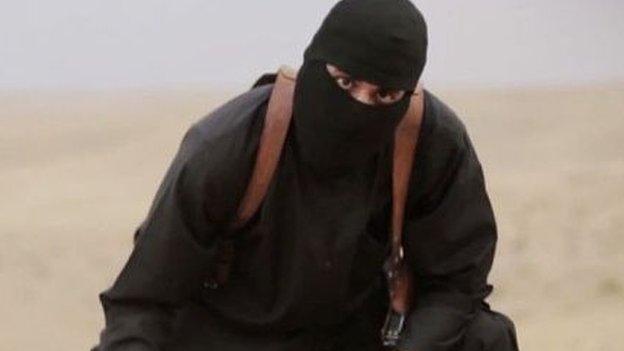
- Published13 November 2015
- Published26 February 2015
